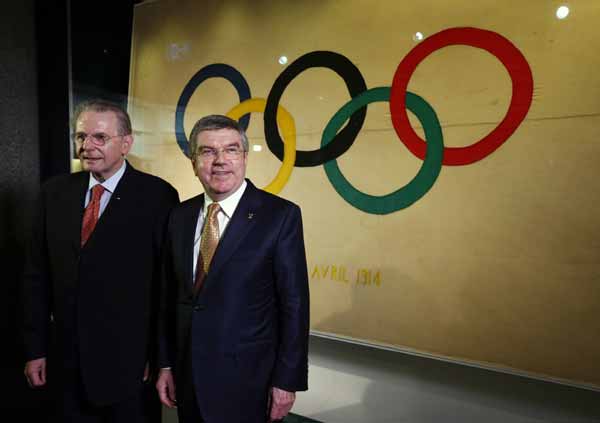

|
 International Olympic Committee (IOC) President Thomas Bach (R) poses with his predecessor Jacques Rogge in a new presentation room at the Olympic Museum in Lausanne December 10, 2013. [Photo/Agencies] |
BEIJING - The Olympic Movement was at a crossroads in 2013 as the International Olympic Committee underwent a shift in power in more than a decade by electing Thomas Bach as the new president to succeed Jacques Rogge.
The 59-year-old German claimed an overwhelming victory over five rivals in a secret voting by his fellow IOC members in Buenos Aires in September, which was widely interpreted as a message that the IOC wants to sail in the safe waters as it has been during Rogge's 12-year tenure at the helm of the world's leading sports organization.
Rogge, who succeeded Juan Antonio Samaranch in 2001, has restored the reputation of the IOC after the bribes-for-vote scandal over the 2002 Salt Lake City Winter Games. The affair clouded his predecessor Samaranch's final years in power.
The 71-year-old Belgian took a hard line against doping and ethics violations, created the Youth Olympics in 2010 and oversaw a growth in financial reserves. Under his watch, the IOC has also taken the Olympics to new places, including awarding the 2016 Games to Rio de Janerio.
Although Rogge was leaving the Olympic Movement in much sturdier shape, the ninth IOC president has much to do.
Bach's first priority is to ensure a successful Sochi Games next February. The build-up to the Sochi Olympics has been overshadowed by western criticism of a recent Russian law outlawing the promotion of gay propaganda among minors, an issue that has raised concerns about the conditions for athletes and spectators.
The IOC has said it received assurances from the Russian government that it will respect the Olympic Charter as public protest zones would be set up in Sochi during the Winter Games. "This is a measure we welcome, so that everybody can express his or her free opinion," Bach said.
And with less than three years to go, preparations for the 2016 Games in Rio de Janerio remain dogged by construction delays, environmental worries and financial uncertainties. Warning that Brazil has "no time to lose," Bach said he will travel to Brazil in the next couple of months to meet with President Dilma Rousseff and Rio organizers.
"There is not a single moment to lose," he said. "Every effort has to be made, every single day, to bring the construction of Olympic sites and infrastructure forward."
There are even much bigger threat to the long term health of the Olympic Movement. Among the most pressing problems for the IOC are reforming the sports program, keeping the Games manageable for hosts and at the same time not seeing income dwindle, and continuing the fight against doping and match-fixing.
In the July to September edition of the Olympic review, Rogge made the point that one of the great strengths of the Olympic Movement is its ability to adapt to change while adhering to the traditions and core values that define the mission of the IOC.
Rogge was emphatic in making the point that no organization can survive over time without accepting change. He acknowledged that a new IOC president will undoubtedly bring more change to the Olympic Movement.
Indeed, Bach, the first Olympic champion to head the IOC, pledged outright in his election manifesto to reform the structure of the Games and the bidding procedure for the Olympics to attract more candidates.
He has made clear he wants a more flexible system for setting the Olympic sports program, an issue which came to prominence after wrestling was stunningly dropped from the 2020 Games last February. The sport was voted back onto the program in September, defeating squash and a combined baseball-softball bid.
Bach, who won Olympic gold medal in the fencing team foil event at the 1976 Games, has also been talking about revamping the process of bidding for the Olympics, seeking to cut costs and ask for more "creativity" from potential host cities.
"From most of them (it's) always the same answer because they all answer they way they think we want to hear," Bach said. "I would like to invite the potential bidding cities to tell us how they think that the Olympic Games would fit best in their social and natural environment. It depends on diversity and creativity for them to stay how they see it."
Three months after assuming the presidency, Bach began to press forward with his campaign to reform. He took his executive board to Montreux last week for a four-day "brainstorming session" on what Bach calls the "Olympic Agenda 2020" - his blueprint of possible changes during his eight-year tenure.
During the course of the discussions, several decisions were agreed and the outcomes of the sessions will next form part of a wider debate at the IOC Session to be held before the Olympics in Sochi next February where Bach and the executive board will join with the rest of the members. Proposals selected at the IOC Session will be taken forward in working groups, which will present concrete proposals later in the year.
"It was very good for me to see on the principle issues there is broad consensus within the executive board," Bach said. "They are receptive to changes to all the issues."